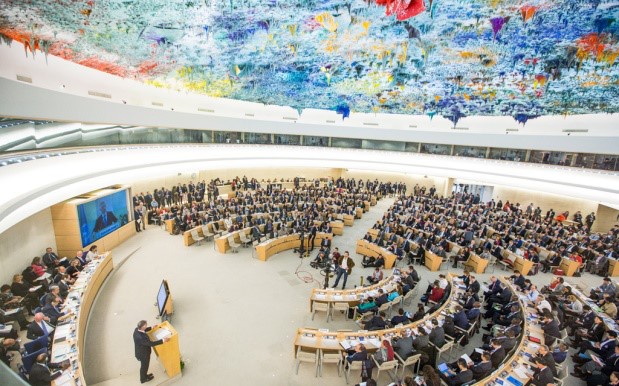On Thursday 11 October, Americans for Democracy & Human Rights in Bahrain (ADHRB) participated in Saudi Arabia’s 3rd cycle Universal Periodic Review (UPR) pre-session panel, organized by UPR Info. ADHRB spoke alongside several NGOs including Reprieve and the Gulf Centre for Human Rights (GCHR).
GCHR spoke first at the panel, highlighting ongoing concerns surrounding women’s rights in Saudi Arabia. In their remarks, GCHR noted that while the Saudi government has granted women the right to drive, security forces have targeted and arrested many women’s rights defenders who fought for this right. With a wave of mass arrests in May 2018, many women’s rights defenders were arbitrarily detained due to their activism and advocacy. In addition to these arrests, however, there are structural concerns, as the system of male guardianship over women system remains in place.
Reprieve followed GCHR and drew attention to Saudi Arabia’s continued use of capital punishment. Reprieve noted that the kingdom has executed over 100 people in 2018, while many remain on death row or at risk of a death sentence. Among those who are on death row are at least seven minors who were sentenced to death based on spurious counter-terror charges stemming from their participation in protests. Reprieve also highlighted that many of those who are executed in the kingdom are non-nationals convicted on drug charges, and indicating a link between drug charges, non-nationals, and human trafficking. Reprieve closed their statement calling on Saudi Arabia to institute a moratorium on the death penalty, especially for minors currently on death row.
ADHRB spoke third and discussed the kingdom’s restrictive legal framework, restrictions on free expression and opinion, arrests of bloggers and journalists, and nominal reform efforts surrounding the Saudi Vision 2030. ADHRB highlighted the kingdom’s use of restrictive laws, such as the 2007 Anti-Cyber Crimes Law and the 2014 Law on Terrorism and Its Financing, which was updated in 2017 to harass, target, detain, arrest and occasionally execute critics of the government, bloggers, human rights defenders, activists, and members of the religious minority communities.
We also highlighted that during its second cycle UPR, Saudi Arabia received several freedom of expression-related recommendations. While the kingdom fully accepted most of them, thus signaling its intention to address such concerns, the government has instead failed to implement the recommendations. Rather, the Saudi government continues to criminalize specific forms of free expression, most notably criticism of the government, ruling family, and religious establishment. Among those who have been arrested and imprisoned under free expression charges are Nadhir al-Majid, Raif Badawi, Wajdi al-Ghazzawi, and members of the Saudi Civil and Political Rights Association (ACPRA), a prominent human rights organization that was forced to close after facing sustained government pressure.
ADHRB also addressed Saudi Arabia’s Vision 2030, noting that Vision 2030 is a plan to modernize the nation and open it up for business, and that it has made marginal progress in advancing women’s rights, in particular their ability to participate in the job market. However, Vision 2030 distracts from deepening repression and widespread arrests and wholesale restrictions on fundamental freedoms. Indeed, since Mohammed bin Salman became the Crown Prince he has overseen several waves of mass arrests and the suppression of remaining human rights and civil society organizations.
In closing remarks, ADHRB drew attention to the recent news about the disappearance and potential murder of journalist Jamal Khashoggi in the Saudi consulate in Turkey. Khashoggi’s arbitrary detention and enforced disappearance in a foreign country is symbolic of the repression present in Saudi Arabia and of the impunity Saudi security forces act with when they move to detain and target dissidents. His disappearance coincides with the kingdom’s upcoming UPR in November, and states must take a stand against Saudi Arabia’s ongoing human rights abuses by offering serious recommendations that will help the kingdom reform its human rights record. States must also demonstrate commitment to following up on their recommendations and hold Saudi Arabia accountable if it fails to act upon those it has accepted.





